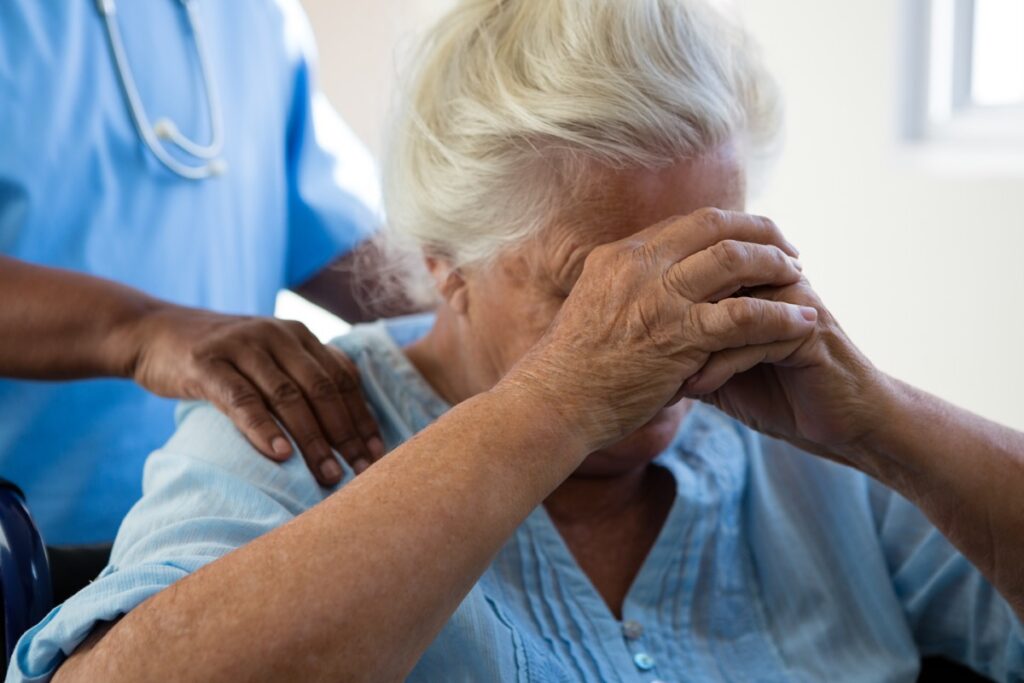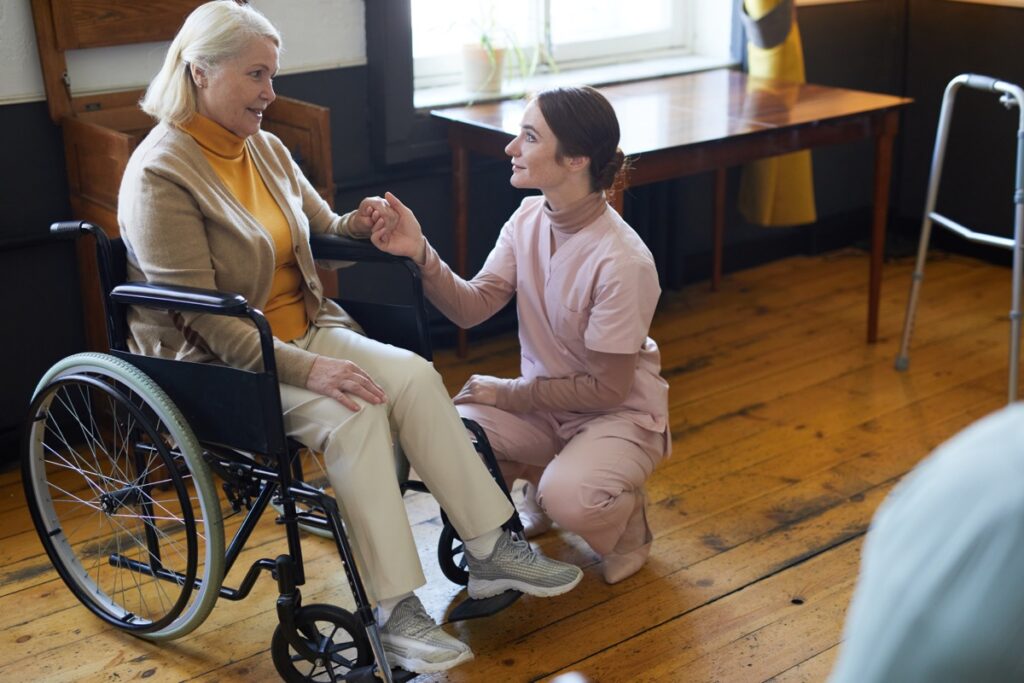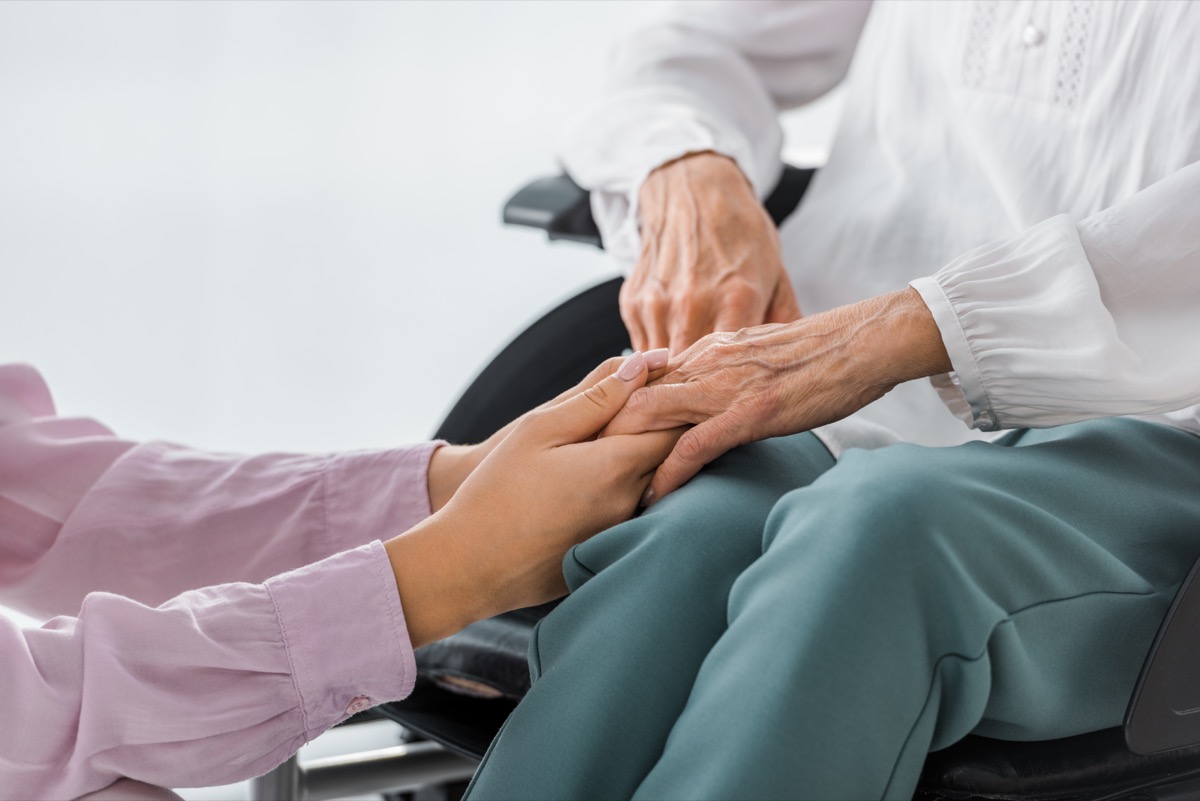Nursing home abuse is a disturbingly common issue that affects thousands of elderly individuals every year. While we would like to think that our loved ones are receiving the care and attention they deserve in nursing homes, the reality is that abuse can and does happen. This is why it is crucial to raise awareness about the issue and take steps to prevent it. This article will explore what constitutes nursing home abuse, why it occurs, and how it can be prevented.
If you believe your loved one is a victim of nursing home abuse, please contact the experienced nursing home abuse attorneys at Saladino & Schaaf. With over 25 years of experience representing Kentucky nursing home abuse clients, Saladino & Schaaf has a team of skilled and compassionate attorneys dedicated to fighting for justice for those who have been wronged.

Common Types of Nursing Home Abuse
Nursing home abuse is defined as any form of mistreatment or harm that is inflicted on an elderly resident of a nursing home. Several different types of abuse can occur in nursing homes, including:
- Physical abuse: Use of force or violence that results in injury or pain. Physical abuse includes hitting, kicking, pushing, and wrongfully restraining residents.
- Emotional abuse: The use of words or actions that cause emotional distress or pain. Examples of emotional abuse include yelling, belittling, ignoring, and isolating residents.
- Sexual abuse: Any form of unwanted sexual contact or behavior. This includes inappropriate touching, rape, and sexual harassment.
- Financial abuse: Unauthorized use or theft of an elderly resident’s funds or property. Stealing money or possessions, forging signatures, and coercing residents into giving away their assets are all examples of financial abuse.
- Neglect: Failure to provide adequate care or attention to a resident’s needs. Examples of neglect include not providing proper medical care, withholding food or water, and failing to keep living spaces clean and safe.
According to the National Center on Elder Abuse, approximately 1 in 6 nursing home residents experience some form of abuse each year. In these cases, neglect and emotional abuse are the most commonly reported types. It’s important to be vigilant and aware of any signs of abuse in nursing homes so that appropriate action can be taken to prevent further harm.

Signs of Nursing Home Neglect in Elderly Residents
Neglect can have serious consequences for nursing home residents, and it’s important for families to be aware of the signs of neglect and to take action if they suspect it is occurring. Some common signs of nursing home neglect may include:
- Malnutrition or dehydration: Signs of malnutrition or dehydration include weight loss, dry mouth, cracked lips, sunken eyes, and decreased urine output. Residents not receiving enough food or fluids may also appear weak or lethargic.
- Untreated medical conditions or injuries: Signs of untreated medical conditions or injuries include unexplained pain, swelling, or discomfort. In some cases, residents may also have visible injuries, such as bruises or cuts.
- Unsanitary living conditions: Residents living in unsanitary conditions may have soiled clothing or bedding, or may be surrounded by clutter or trash. The living areas may also have an unpleasant odor or be infested with pests.
- Lack of personal hygiene: Residents not receiving proper care may have poor personal hygiene. This may include dirty hair, unbrushed teeth, and dirty or unkempt nails.
- Bedsores or pressure ulcers: Bedsores or pressure ulcers can develop when residents are not moved or turned frequently enough. These sores may appear as red, tender areas on the skin and can lead to serious infections if left untreated.
- Infections or illnesses that go untreated: Residents not receiving adequate care may be more susceptible to infections or illnesses. Signs of untreated infections or illnesses may include fever, cough, or difficulty breathing.
- Soiled or unchanged bandages or dressings: Residents’ wounds or injuries may have soiled or unchanged bandages or dressings. This can lead to infections or other complications if left untreated.
- Lack of assistance with daily living activities: Residents not receiving enough assistance with daily living activities may have poor personal hygiene or be at risk for falls or other injuries.
- Poor medication management or medication errors: Residents not receiving proper medication management may miss doses or receive the wrong medication. This can lead to serious health complications or even death.
- Lack of social interaction or engagement: Residents not receiving enough social interaction or engagement may become isolated and withdrawn. This can lead to depression and other mental health issues.
Signs of Emotional Abuse in Nursing Home Residents
Emotional abuse can be more difficult to detect, but several warning signs may indicate it is occurring:
- Withdrawal: A resident may suddenly become more withdrawn and stop engaging with others if they are experiencing emotional abuse. They may hesitate to speak up or express their feelings, leading to isolation and helplessness.
- Fear: An emotionally abused resident may seem afraid of certain staff members or try to avoid certain areas of the nursing home. They may not report the abuse for fear of retaliation.
- Depression: Emotional abuse can cause sadness and hopelessness, which may manifest as depression. Emotional abuse can result in a resident who becomes more depressed or quiet than usual.
- Changes in behavior: You may notice changes in behavior, such as aggression or anger. A resident may suddenly become more aggressive or easily agitated.
- Low self-esteem: Emotional abuse can cause residents to feel worthless or powerless. If a resident suddenly begins to exhibit low self-esteem or lack of confidence, it may be a sign that they are experiencing emotional abuse.
It’s important to note that these signs can also indicate other issues, so it’s important to investigate further and speak with nursing home staff or a personal injury attorney if abuse is suspected. By being vigilant and aware of the signs of abuse, we can help protect our loved ones and ensure they receive the care and respect they deserve in nursing homes.

Questions to Ask Your Loved One
If you suspect your loved one is a victim of nursing home abuse, it’s important to talk with them. Some questions you can ask include:
Has Anyone Limited Your Daily Activities?
Limiting a senior’s daily activities may be a sign of willful deprivation, a form of elder abuse with serious consequences such as depriving seniors of food, water, medications, medical care, or even restricting them from seeing loved ones. Emotional abuse may also occur when a senior’s activities are restricted.
Has Someone Threatened You or Spoken To You in a Threatening Tone?
Threatening verbal communication can be emotionally damaging to seniors and may cause them to feel scared, agitated, or withdrawn. It can also lead to mental health issues such as anxiety or depression. In some cases, the abuser may use threats to prevent the senior from seeking help from loved ones, nursing home staff, or law enforcement officials.
Has Someone Asked You For Money or Asked You To Sign Papers You Didn’t Understand?
Forcing elders to give money or sign strange papers may indicate financial abuse, which can drain their life savings and lead to feelings of worthlessness, depression, and distrust.
According to the National Adult Protective Services Association (NAPSA), financial abuse may go undetected for extended periods, particularly among seniors with mental or physical health issues who struggle to manage their finances.
Has Anyone Ever Touched You Without Your Consent or Hit You?
Inappropriate touching or physical violence towards seniors is unacceptable and may indicate sexual or physical abuse. Physical abuse may also manifest as broken bones, bruises, scratches, or loss of hair or teeth. Sexual abuse may result in physical injuries around the genitals. Even without physical injuries, unwanted touching, such as rubbing genitalia, can traumatize seniors and is considered sexual assault.
It’s important to approach these sensitive questions delicately, perhaps by asking your loved one to explain how they got any visible injuries. Identifying and addressing physical and sexual abuse in nursing homes is critical to ensuring the safety and well-being of our loved ones.
Other Questions to Ask Yourself
- Does my loved one seem withdrawn or more moody than normal?
- Are they avoiding direct eye contact with you or others?
- Do they seem unclean or have poor hygiene?
- Do they exhibit strange cuts, bruises, or other physical injuries?
- Are they inconsistently taking their medications?
Why is Nursing Home Abuse So Common?
Several factors can contribute to nursing home abuse, making it more likely to occur. Some of these factors include:
- Understaffing: Many nursing homes are understaffed, which can lead to inadequate care and attention for residents. This can result in staff members becoming overwhelmed and stressed, which may increase the likelihood of abusive behavior.
- Lack of training: Nursing home staff members may not receive proper training on caring for elderly residents. This can lead to a lack of knowledge and skills in certain situations, resulting in abusive behavior.
- Inadequate supervision: In some cases, nursing home staff members may not be adequately supervised, which can result in unchecked abusive behavior. This can occur when management fails to provide proper oversight or staff members are not held accountable for their actions.
- High turnover rates: Nursing homes may have high turnover rates, with staff members coming and going frequently. This can lead to a lack of continuity in care and familiarity with residents, contributing to abusive behavior.
These factors can create an environment where nursing home abuse is more likely. It’s important for nursing homes to address these issues by ensuring adequate staffing levels, providing proper training for staff members, and implementing systems of accountability and oversight. By addressing these factors, nursing homes can help prevent abuse and ensure the safety and well-being of their residents.

Selecting a Safe & Reputable Nursing Home
Preventing nursing home abuse starts with choosing a safe and reputable nursing home for your loved one. Here are some tips for families on how to choose a nursing home that is safe and free from abuse:
- Research the nursing home: Look up the nursing home online and read reviews from other families. Check for any complaints or violations on the nursing home’s record.
- Visit the nursing home: Schedule a visit to the nursing home and tour the facilities. Observe the staff and how they interact with residents.
- Ask questions: Ask the nursing home staff about their policies on abuse and neglect. Inquire about their hiring practices and staff training programs.
- Check for adequate staffing: Ensure that the nursing home has enough staff members to care for residents. Understaffing can lead to neglect and increase the risk of abusive behavior.
Check out this helpful worksheet for evaluating nursing homes. ProPublica also provides a tool called Nursing Home Inspect, which combines data from regulators and over 80,000 inspection reports from multiple sources to evaluate the safety of nursing homes. Their keyword search tool allows you to search for specific issues that matter most to you.
Take Steps to Protect Your Loved Ones
In conclusion, nursing home abuse is a serious issue that affects many elderly individuals every year. It can take many forms, leading to severe injury, emotional distress, or even death. If you suspect your loved one is the victim of nursing home abuse, it’s important to take action. Legal help from a personal injury attorney like Saladino & Schaaf may also be necessary to ensure justice is served, other residents remain safe, and compensation is obtained.
It’s important to remember that we all have a responsibility to protect the elderly and ensure they are treated with dignity and respect in nursing homes. If you suspect nursing home abuse, don’t hesitate to take action and seek help.
Fight Back Against Nursing Home Abuse
At Saladino & Schaaf, we understand that nursing home abuse can have devastating consequences for the victim and their family. We are committed to holding those responsible accountable for their actions. Our attorneys understand the laws and regulations that govern nursing homes and are skilled at building strong cases to help our clients obtain the compensation and justice they deserve.
If you or a loved one has been a victim of nursing home abuse, contact Saladino & Schaaf today for a free case evaluation. Our experienced attorneys are dedicated to fighting for justice for those who have been wronged. Contact us today and take the first step towards protecting your loved one and obtaining the justice and compensation you deserve.
Schedule A Free Case Evaluation
Paducah: (270) 444-0406
Murray: (270) 753-1529


